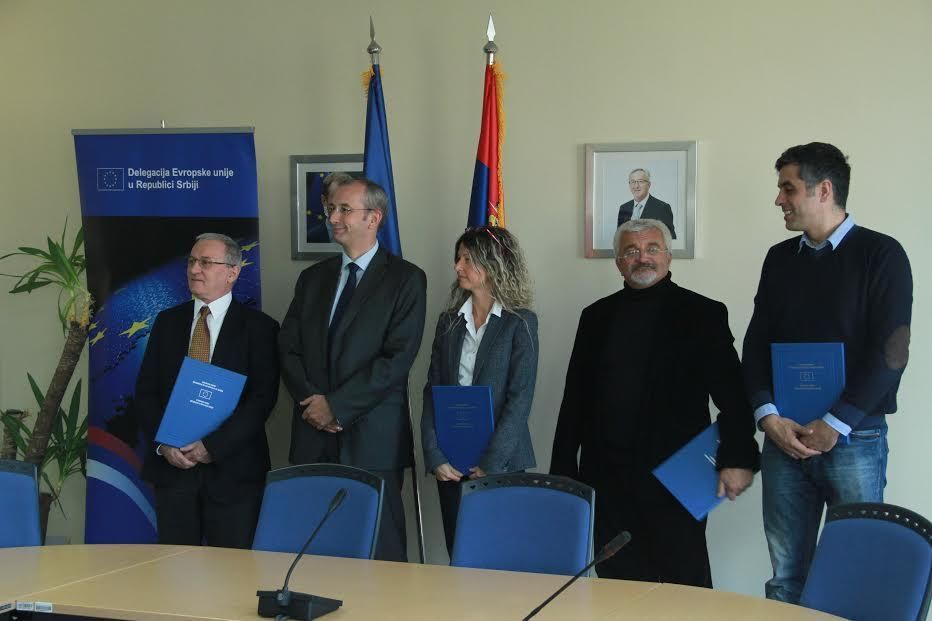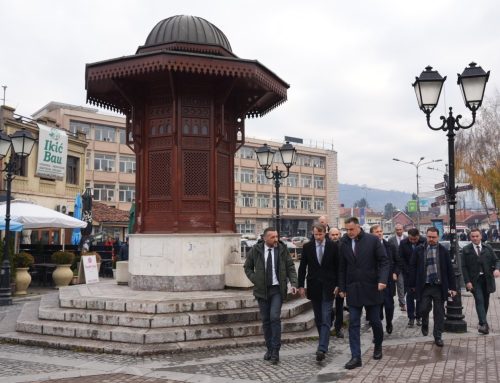Ambassador Michael Davenport, Head of the EU delegation in Serbia has presented grant agreements to the partners – Serbia’s Commissariat for Refugees and Migration and civil society organisations Hilfe zur Selbsthilfe (HELP), Arbeiter Samariter Bund (ASB) and Danish Refugee Council (DRC), to start the implementations of a new aid package worth 7 million euros to help Serbia cope with the unprecedented refugee flows. The package will be used to increase operational capabilities of Serbia’s national and local authorities, as well as for purchasing equipment necessary for helping refugees. The funding comes from a special measure adopted on October 7 by the European Commission.
The €7 million special measure is structured in the following way:
- A direct grant of €1.5 million has been awarded to the Commissariat for Refugees and Migration to strengthen its operational capacity to support needs of refugees and migrants and to increase the capacity to coordinate the assistance offered by the reception centres across Serbia.
- Three direct grants in the amount of €1 million each have been awarded to HELP, ASB and DRC to strengthen their capacity to assist the authorities in providing services to effectively manage the migration flows
- The EU Delegation to Serbia is purchasing equipment and supplies in the value of €2.5 million for the Ministry of Interior and Commissariat for Refugees and Migration. The equipment and supply will include vehicles (vans, buses, passenger vehicles, etc.) to help Serbia deliver the necessary services to refugees. First deliveries are expected towards the end of this year.
In addition to the special measure for Serbia, EU’s Humanitarian Aid and Civil Protection directorate has allocated another €8.5 million for humanitarian aid for Serbia and the Former Yugoslav Republic of Macedonia. The funding will be deployed in the following weeks and will be used to provide basic emergency services such as food, hygiene, health care, psycho-social support, temporary shelter, and protection to refugees and migrants, as well as coordination and data gathering on migration routes.

Photo: FoNet
Last week, the European Investment Bank (EIB) contributed with 5 million euros to the Migrants and Refugee Fund (MRF) recently founded by the Council of Europe Development Bank (CEB). This is the largest donor contribution to date. EIB chairman Werner Hoyer said: “Ensuring migrants and refugees have access to shelter, food, medical aid and personal security is now crucial and urgent to address the current emergency. We strongly support the timely establishment of the Fund. The EU bank is ready to offer further support, including closer cooperation with the CEB on individual projects to address longer-term needs.”
Background:
Emergency aid already provided by the European Union for Serbia
The EU started delivering aid to Serbia in September 2015.
EU’s Humanitarian Aid and Civil Protection directorate (ECHO) in September distributed the first humanitarian aid package worth €150,000 which included the most necessary aid such as water, food and clothing items to refugees in Presevo, Bujanovac, Subotica, Kanjiza, Zajecar, Negotin and Pirot. The aid package was channelled through the Disaster Relief Emergency Fund (DREF) of the International Federation of Red Cross and Red Crescent Societies (IFRC), and was distributed by the Red Cross of Serbia.
The EU Delegation to Serbia and the Swiss Agency for Development and Cooperation in September deployed €237.000 from the European PROGRES programme for additional needs. Waste disposal bins and sanitation equipment have been purchased and delivered to the reception centre in Presevo. A garbage truck will be delivered at the beginning of the New Year.
Ongoing and future assistance in the area of migration and border management
In the medium and long-term, the EU will continue supporting the reform of Serbia’s asylum system and improving border controls. Projects are already being implemented or will start within the next year:
- €3.2 million will be used to expand existing accommodation capacities for migrants in Serbia.
- An EU twinning project of €1 million is already ongoing with a focus on drafting a new law on asylum and stepping up the reform of the asylum system.
- €4 million have been allocated to further develop Serbia’s border surveillance systems.
A regional programme worth €8 million is also under preparation to deal with protection-sensitive migration management in the Western Balkans and Turkey, mainly related to Serbia and the former Yugoslav Republic of Macedonia.
Since 2001, the EU has acted as Serbia’s main partner and donor when it comes to managing migration having allocated some €80 million for borders and migration. This assistance includes, amongst others, construction and renovation of border crossings, supply of equipment and IT infrastructure for better border management, upgrade and extension of asylum facilities, as well as assistance to improve the efficiency of the asylum system.




